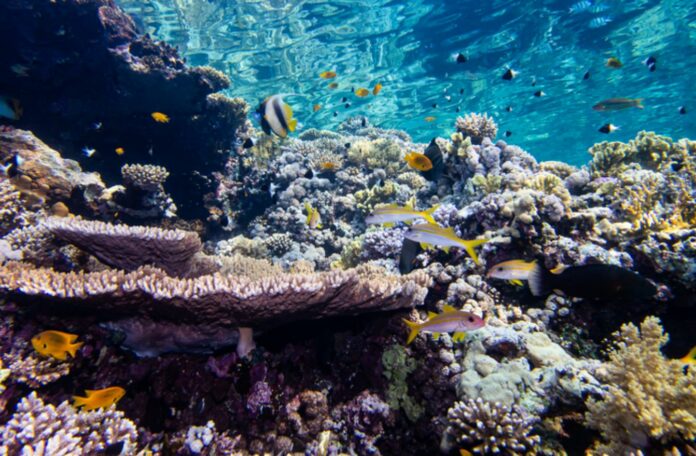Coral reefs heavily rely on lunar-triggered broadcast spawning events to sustain and restore themselves following significant challenges like mass bleaching.
However, groundbreaking research utilizing light pollution data and meticulous spawning observations has revealed a concerning phenomenon: corals exposed to artificial light at night (ALAN) are spawning closer to the full moon, with a time difference of one to three days compared to their counterparts in unlit reef areas.
This shift in spawning nights could have detrimental consequences, potentially reducing the chances of successful fertilization and the survival of coral eggs. These eggs are instrumental in producing new adult corals that aid in the recovery of reefs after disturbances like bleaching events.
The findings, recently published in Nature Communications, emerged as part of the Artificial Light Impacts on Coastal Ecosystems (ALICE) project, funded by the Natural Environment Research Council. This research adds to the growing body of knowledge on the impact of artificial light on marine ecosystems and highlights the significance of preserving natural lunar cycles for the health and resilience of coral reefs.
Building upon a research study published in December 2021, which extensively identified the ocean areas significantly impacted by light pollution, the latest findings shed further light on the subject.
The previous study unveiled that approximately 1.9 million square kilometers of coastal ocean, at a depth of one meter, are subjected to biologically significant Artificial Light At Night (ALAN), encompassing approximately 3.1% of the global Exclusive Economic Zones.
In this new study, scientists merged this valuable data with a comprehensive global dataset consisting of 2,135 observations of coral spawning throughout the 21st century.
By doing so, they were able to illustrate the potential impact of ALAN on advancing the triggers for coral spawning. The presence of ALAN creates a perceived period of minimal illumination between sunset and moonrise on nights following the full moon, possibly leading to an alteration in natural spawning patterns.
Corals play a vital role in maintaining the health of our oceans but are increasingly suffering from human-induced damage.
This research, according to Dr. Thomas Davies, a Marine Conservation Lecturer at the University of Plymouth, serves as the lead author of the study, demonstrates that their decline is not solely influenced by changes in the ocean, but also by the continued expansion of coastal cities as we strive to accommodate the growing global population.
Dr. Davies suggests to mitigate the harm caused, one potential solution could involve delaying the activation of nighttime lighting in coastal regions, preserving the natural dark period between sunset and moonrise that triggers coral spawning.
“That would potentially raise a number of economic and safety issues, but is something we potentially need to consider to ensure our coral reefs are given the best chance of survival.”
Dr. Tim Smyth, the Head of Science for Marine Biogeochemistry and Observations at Plymouth Marine Laboratory and senior author of the study, further adds, “This study further emphasises the importance of artificial light pollution as a stressor of coastal and marine ecosystems, with the impacts on various aspects of biodiversity only now being discovered and quantified. A critical first step along that path was enabled with our global in-water light pollution atlas which highlighted for the first time the true extent of the problem, which hitherto had gone unrecognized.”
The research encompassed coastal regions worldwide, with a specific focus on the adverse impacts of light pollution on coral reefs, notably in the Red Sea and Persian Gulf.
These regions stand out due to extensive coastal development in recent times, posing significant threats to coral reefs located in close proximity to the shore. The vulnerabilities faced by these coral ecosystems are particularly heightened in these areas.
According to Co-author Professor Oren Levy, urbanization and the close proximity of the coastline to the reefs have led to a significant impact of Artificial Light at Night (ALAN) on the Red Sea and the Gulf of Eilat/Aqaba. Despite the resilient nature of corals in the region, known for their ability to withstand high temperatures, the disturbance caused by ALAN can disrupt the crucial timing of coral spawning with the moon phases. This disturbance poses a serious threat, potentially resulting in a decline in new coral recruits and a reduction in the overall coral population. The delicate balance of coral reef ecosystems calls for immediate attention to mitigate the harmful effects of ALAN on coral reproduction in this vital marine environment.
“It is crucial that we take immediate action to reduce the impact of ALAN on these fragile marine ecosystems. By implementing measures to limit light pollution, we can protect these vital habitats and safeguard the future of the world’s oceans. It’s our responsibility to ensure that we preserve the biodiversity of our planet and maintain a healthy and sustainable environment for generations to come.”
Source: 10.1038/s41467-023-38070-y
Image Credit: Sahchaf Ben Ezra
